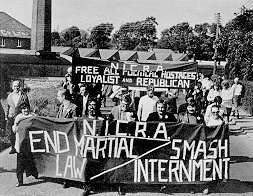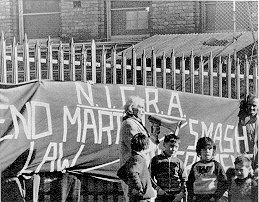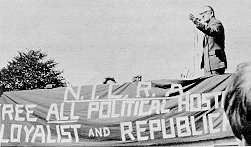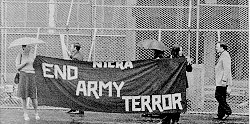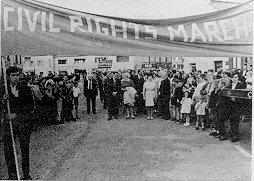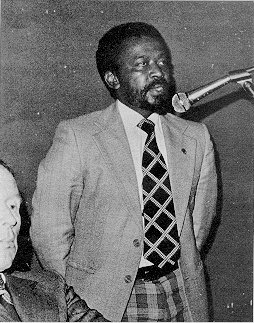
"We Shall Overcome" .... The History of the Struggle for Civil Rights in Northern Ireland 1968 - 1978 by NICRA (1978)[KEY_EVENTS] [Key_Issues] [Conflict_Background] CIVIL RIGHTS: [Menu] [Reading] [Summary] [Background] [Chronology] [Main_Pages] [Newspaper_Articles] [Sources] In the second five years of its first decade NICRA had none of the glamour and political excitement that marked its first five years. Gone were the marches, the mass rallies, the sense of immediate achievement. In their place was a continuous round of organising meetings, arranging delegations, attending conferences and issuing press statements. The centre of the political stage was taken over by the gunmen and NICRA has been confined to the wings for the past five years unsure of how or when the drama is likely to end. It has been five years of violence and death in which sectarian killings have become the accepted norm and in which the hopes for political progress have been frustrated by the reciprocal militarism of the British Government, Loyalist paramilitaries and the Provisionals. Essentially nothing has changed since March 1972. Several hundred people have been killed, several thousand violent incidents have been recorded and sectarian violence has reached an all time high, but in terms of politics absolutely nothing has changed. It is this unchanged and unchanging political scene which has forced a change in NICRA's role.
In political terms the past five years has seen little activity. The short-lived Convention and Assembly were nothing more than constitutional interruptions in a period of political stagnancy. Even the change of Government at Westminster from Conservative to Labour in 1974 meant only a change of face in Stormont Castle. The British bi-partisan approach to Northern Ireland, which is nothing more than a tacit agreement that the solution to the problem here is a military one, has guaranteed a continuation of policy which has contributed only to the violence and political stagnancy. Several elections and two referenda have made little impact on the overall political situation, and after several suggestions and proposals the only one which remains to be tried is the granting of civil rights.
One of the more publicised diversions in this period was the rise and decline of the Peace People. Ignited by the tragic deaths of a young family the Peace Movement sprang spontaneously from an aversion to the violence which had dominated Northern Ireland society for the previous seven years. The Peace Movement was a reaction, a backlash against the para-militaries, against the guns and the bombs and against the battle-field conditions that had blanketed normal life in Belfast and other areas. It arose from a sense of frustration against militarism and a genuine desire for a return to peace and normal politics in the country. The mass rallies, the massive upsurge in community consciousness and the deafening roar for an end to the violence were the hallmarks of the movement's early days when thousands marched for peace. They marched nowhere in particular, but by marching they were demonstrating their belief that violence had to end. But the desire for an end to violence was not accompanied by an understanding of the nature of violence and the movement, united by its opposition to violence, soon became divided by its varying concepts of peace.
Its leaders, Betty Williams and Mairead Corrigan, were apolitical. Their politics were the politics of gut reaction. They knew they did not want violence and their courage and determination brought them onto the streets in an attempt to pursue their aims. But after the initial marches they needed a route to follow. What was peace? Who was responsible for the violence? How could the violence be ended? The answers to those questions were provided by Ciaran McKeown, a journalist, who was equally apolitical but who substituted philosophy for politics and illustrated in the long run that he understood neither. McKeown's ideas were grasped thankfully by the two women, largely because his guru image and philosophical pontificating were virginal ideas in a virginal movement and, in a more materialistic vein, because he provided invaluable press and public relations services in the early days of the fledgling group. He was the first brain to turn up and offer his service to the brainless, so he got the job of chief -and only - brain in the formative days of the movement and despite a 100,000 people headstart and the goodwill of press, public and most politicians, he fluffed his chance and led what was potentially the greatest mass movement in Irish history into mass oblivion. Williams and Corrigan made only one mistake - they listened to McKeown. All the subsequent mistakes were his.
His basic problem was one of politics. He failed to recognise that peace - like war - was a political condition that was created by the eradication of the political problems which had caused the violence in the first place. Violence is the result of political intransigence. Peace is established when the intransigence has been removed. The violence in Northern Ireland stemmed largely from the failure of the Government to respond to the demands of the Civil Rights campaign. As the violence progressed and atrocity surpassed atrocity the issue often became clouded by minor violent sideshows, but throughout it all the underlying problem was the denial of civil liberties to an aggrieved section of the population who finally were driven into supporting political demands for an end to the state that would not guarantee their rights.
That McKeown failed to recognise this point soon became obvious, but what did not become clear - and even now is unclear - is exactly what he did believe in. His first reaction was that the violence was sectarian, hence the tear-jerking, lip smacking , body hugging marches up and down the Shankill, which merely succeeded in illustrating what everyone already knew there was little sectarian hostility among ordinary people despite seven years of violence by sectarian para-militaries. Having charged at the great wall of sectarianism and found that it did not exist, McKeown rallied his troops and marched off into philosophy, where his army of support dwindled into the pretentious, the gullible and the ignorant. Peace was no longer even a simple thing like an end to violence. Gradually it became an internal matter of self fulfillment. If one was not at peace with oneself one could not expect peace in the community.
But when the bodies of nine year old Brian Stewart - killed by a British Army rubber bullet -and Daniel McCooey, beaten to death in the Grand Central Hotel Army Base by the same Army - were buried in Belfast philosophy was cold comfort and only the souls of the two dead boys got the chance to be at peace with themselves. The British Army were not trained in philosophy and the paramilitaries were rather hazy on it. In the continuing violence it became difficult to be at peace with oneself and as the RUC began to step up its policy of torture in Castlereagh and other centres, it became a downright insult to ask people to be at peace with themselves when their family, friends and relatives were screaming in agony at the hands of the guardians of law and order. Within six months of its founding the Peace Movement ceased to exist as a coherent and organised body. Its failure to recognise the role of the British Government in the violence was its main weakness. It failed to see the brutality of the RUC. It failed to see the British Army aggression. It failed to see the mountain of repressive legislation behind which Stormont Castle had barricaded itself. All it could see was self fulfillment of the inner self and it was unfortunate that people who should have known better - people like those who wrote influential editorials in the Dublin papers - offered support for Don Quixote and his two Sanchos, tilting at philosophical windmills and rescuing philosophers in distress. It was at this point that the British press -urged on by the Northern Ireland Office - began a conscious campaign to rescue the Movement from oblivion. Comforted by its abdication to irrelevance the Northern Ireland Office nevertheless needed the Peace Movement as a propaganda issue and a Movement which would normally have slid into an embarassing decline was propped up by Fleet Street blood transfusions and a string of British Government diplomatic manoeuvres abroad. Now the head of a paper army McKeown marched on and ultimately arrived at something he called democracy. What was needed he said was internal self fulfillment followed by community fulfillment which would well, fulfill and then there would be, well, fulfillment. And that, he said, would be democracy which would really be community government which would replace existing politicians and then there would be peace. Today Northern Ireland, tomorrow the world. The British Government was delighted. The Peace Movement supporters became disillusioned and they disappeared. Within a year of its founding the whole organisation was a myth. It was a sad end to a potentially great organisation.
Today the Peace Movement exists in Norway and Germany and the United States. Its peace prizes and trusts and grants and finances mean that more windmills can be built and tilted at but a well financed Don Quixote is even more pathetic than a poor one. The British Government are happy - they are the only group of people which the Peace Movement never blamed for the violence at any time. McKeown and the British agree that peace must come from the people of Northern Ireland, a belief that completely abdicates British responsibility for both violence and the establishment of peace.
It is sad that the Peace Movement should have ended as it did, but it is even more unfortunate that the movement should have ever come into being in the first place. The mass of people who supported the Peace Movement in the first few months have now been let down. The great emotional rallies and marches are now nothing more than an embarrassing memory for those who took part. The thousands who marches have been betrayed. They have been let down in the name of peace and having been confused by a seven year war they are now even more confused by what is meant by peace. Repelled by violence, they were disillusioned by peace and their natural reaction has been to find refuge in apathy, a situation which suits the policies of RUC torture and brutality, a condition which allows the Government to implement even more repressive legislation and an overall political atmosphere which created a harking back for the conditions which existed before the troubles began, on the basis that things may have been bad then, but they are worse now. It is an apathy which only pressure and publicity on the issue of civil rights can remove.
For NICRA the past five years have been a mixture of success and failure. The Bill of Rights, for example, has been successfully pushed to the extent that all major political parties and groups in Northern Ireland now accept the idea in principle and, if the political parties adhere to their existing policies, it is possible that such a Bill might form part of any future constitutional settlement for this state. On the debit side, however, the British Government has made no attempt to introduce such a Bill, and it is now likely that such legislation will be delayed indefinitely. Democracy is not part of Westminster's package for Northern Ireland. A military solution takes priority. In other respects NICRA's victories under Stormont have been eroded under Westminster. The Special Powers Act, which NICRA discredited in the eyes of the world, was replaced in 1973 by the Emergency Provisions Act, introduced by the Conservative Government. Under the terms of this act trial by jury is suspended and the verdict is arrived at by a judge. Admissions made by the accused are accepted as evidence unless he can prove that they were made under duress. The security forces can arrest without warrant anyone they wish and detain them for 72 hours without having to give reason. Where a weapon or explosive is found in a particular place the persons there must prove that they did not know it was there, rather than the reverse. The Special Powers Act was resurrected by Edward Heath and the new title of the Emergency Provisions Act is illustrative of how many of NICRA's victories, won in an era of political progress, have been eroded in an era of political repression. In the same way the 'B' Specials were disbanded but the UDR have proved themselves to be equally sectarian and much better equipped in terms of arms and intelligence. The RUC were disarmed but later re-armed. The threat of internment without trial still exists. Arbitrary arrest and short term detention still exist and are used frequently. Torture is still extensively used and brutality by the security forces is the order of the day. Civil rights, despite ten years of campaigning, are still at a low ebb in Northern Ireland. On the other hand there have been victories by NICRA. Local government was reformed and even if the present boundaries and powers have not been subject to detailed investigation, the general principles of local government are acceptable - or would be acceptable if the system were to operate in the manner in which it was intended, that is with the existence of a regional parliament. Housing was taken from local r councils and placed in the hands of a central body. Although this too is far from perfect it is a major step forward in the struggle for democracy. Universal adult franchise is now applied in all elections in Northern Ireland and proportional representation is used for all elections except those to Westminster. The Ombudsman exists and it is an offence to discriminate against anyone on the grounds of religion. The Fair Employment Act and the Sex Discrimination Act are additional legislative victories.
But NICRA's real success does not lie in the quantification of legal victories. It lies rather in that vast unquantifiable field of political progress in which Northern Ireland was brought screaming from the politics of the nineteenth century into the present century. It was civil rights, the demand for equality, which finally smashed the Unionist political hegemony at Stormont. It was civil rights which helped bring whatever normal politics exist in Northern Ireland. It was civil rights which pinpointed Britain's guilt in Ireland. And it was the violence which wiped out every single one of these victories. The Provisionals, the Loyalist para-militaries and the British Army have carried on the violence and the actions of the sectarian political parties have provided the political excuses for the continuation of that violence. The erstwhile supporters of the civil rights campaign have drifted away, their interest in democracy nothing more than a political fad. The PD, led by Farrell, Devlin, and Toman marched on and on, until their supporters dropped away in ones and twos. The bulk of the former student revolutionaries marched back to their middle class origins, content in the knowledge that they marched in 'sixty-nine and secure in the conviction that they will never march again. Today's dentists, doctors, soliticitors, journalists and Crown Prosecutors are yesterday's PD.
Their former leadership, knowing how to march, but unsure of their direction, marched themselves straight into the political workhouse. Bernadette Devlin, after a brief flirtation with the IRSP [ Irish Republican Socialist Party], marched into the political doldrums, her parliamentary seat in Unionist hands. Cyril Toman, the revolutionary young student, marched into the political doldrums of Provisional Sinn Fein's Ard Comhairle, and only Michael Farrell marches on.
The SDLP have evolved into the state's second largest sectarian power bloc. Their policy on civil rights is that civil rights must wait. Their immediate demand is for a political settlement in which they will have an appropriate share of the power and then, perhaps, civil rights can be discussed. In the meantime they have abandoned their former civil rights demands and concentrated on a demand for political power. Their attitudes to civil rights issues has evolved according to the political situation. In the summer of 1977, for example, their attitude towards the unacceptability of the RUC showed signs of weakening when the RUC had cracked a few Protestant skulls. That, in the eyes of the SDLP, was verging on RUC acceptability. In their minds repression shared is repression halved! In the field of Unionism nothing has changed. Following the schisms of the early 1970s, there are now only two important groupings: the Official Unionist Party, inheritors of the Glengall Street traditions of bigotry and political patronage, and the Democratic Unionist Party, inheritors of the Old Testament and neo-fascism. Brian Faulkner lies in a County Down Churchyard: his political party is equally dead having been cremated in the 1977 local government elections. In the South, Fianna Fail have long abandoned their passing interest in Northern civil rights, and their involvement in the early days of the Provisionals initially caused them electoral damage in the face of increasing Northern violence. Only an incompetent coalition brought them to power. Former Southern speakers on civil rights platforms are also embarassingly silent on the issue today. Conor Cruise O'Brien, for example, has abandoned his interest in civil rights in the North and while in office concentrated instead on enforcing repression in the South. Only the denial of civil rights by the Unionists was wrong! The final group which has played such a major part in the past 10 years is the IRA. The Provisionals were the men who first broke the civil rights pledge of no talks until Internment ends. Their sporadic sectarian war against Protestants and their campaign of murder against civilians has been one of the greatest denials of civil and human rights in recent Irish history. Fuelled initially by Fianna Fail money they rocketed across the Irish political scene leaving death and destruction, reactionary politics and repressive legislation in their wake, and their present orbit is powered by the continuing sectarianism generated by their own actions. Their production line in martyrs and heroes has provided the raison d'etre for the continuation of their campaign and the living and dead bodies of their members which lie scattered across the prisons and cemeteries of Ireland are mute testimony to the futility of their actions. They did not want British rights. They wanted Irish rights. Their actions have ensured that they now have none of the rights of either nationality, and the rest of us must suffer accordingly.
As an organisation NICRA has returned to its broad base of support. For the past three years the majority of its executive committee have been non-affiliated in terms of party politics. Like the original executive members, they do not carry their political affiliations onto the executive committee. Ten years on political life continues in Northern Ireland much as it did in 1967. The only major difference now is that there is also a great amount of political death. Things might have been different if NICRA's demands had been implemented, and even today things could change if the original civil rights demands were acted on. If only they had granted civil rights, things would have been a lot different in Ireland today. If only they had granted civil rights........
| |||||||||||||
CAIN
contains information and source material on the conflict
and politics in Northern Ireland. CAIN is based within Ulster University. |
|
|
|||
|
Last modified :
|
||
|
| ||
